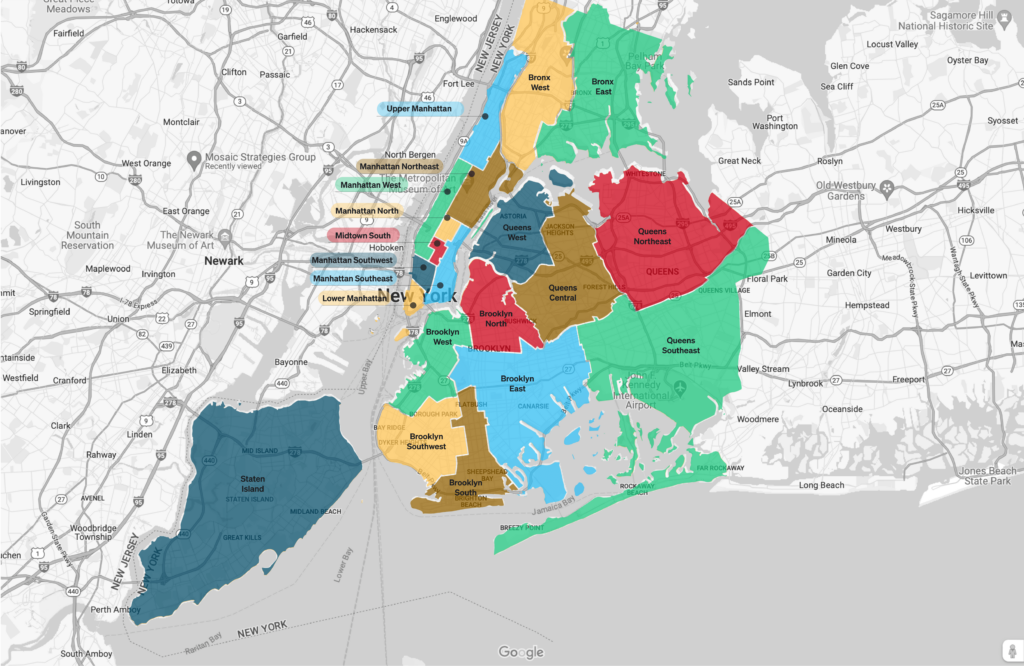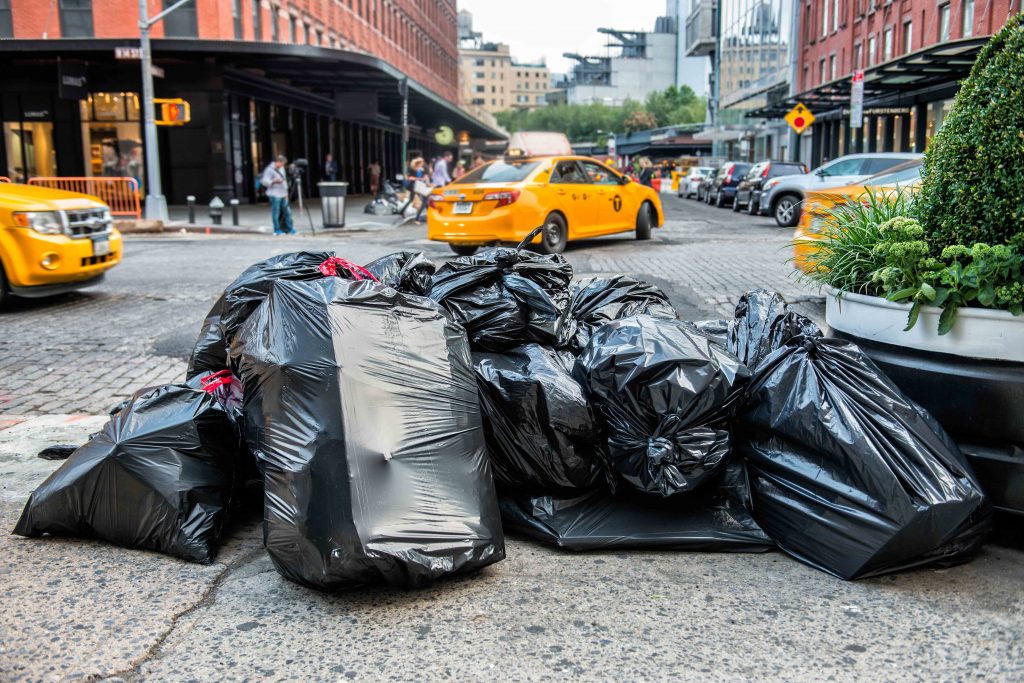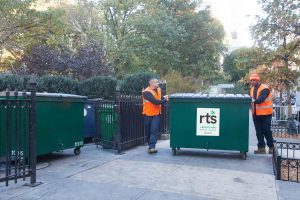TLDR
The awardees for NYC Commercial Waste Zone have been released and now is the time to find the best hauler for your business. Help New York become cleaner and more sustainable by finding the right waste management provider today.
As the largest commercial waste market in the US, and one of the earliest to embrace private waste hauling more than 60 years ago, New York City’s commercial waste industry has long been serviced piecemeal by hundreds of hauler operators. While encouraging enterprising haulers, this has made it difficult for businesses to adapt to today’s environmental standards.
In an effort to move towards a more organized and consolidated approach to waste management, the 2019 Commercial Waste Zones bill has broken down the five boroughs into 20 commercial zones. The aim is to make the city safer, cleaner, and more efficient – while maintaining competition through a non-exclusive zoning model – by creating incentives for the most responsible hauler-operators to service the city.
As one of the hauler operators awarded multiple CWZs (commercial waste zones) across the city, including the city-wide containerized contract, we’re here to share our experience of what the NYC waste zones will mean for your business. Additionally, you’ll find information on how to get the most cost-effective and sustainable hauling contracts for your specific needs. Read on to learn more.
What are NYC Commercial Waste Zones?
NYC’s Commercial Waste Zones are pre-defined geographical areas of the city that cover the five boroughs in their entirety. Each zone is served by up to three private hauler/carters which businesses can choose from to meet their waste management requirements.
Hauler companies have already bid, in response to a Request for Proposal (RFP), for the rights to service one or multiple of these commercial zones, and the contracts for each zone have already been awarded by the Department of Sanitation.
What Is the Purpose of NYC Commercial Waste Zones?
The NYC Commercial Waste zone project has multiple aims. Most prominently, reducing the truck traffic associated with commercial waste collection by 50% while also eliminating millions of carting truck miles from NYC streets every year.
In addition, the aim is to strengthen service standards while still allowing for customer choice, as well as building a new regulatory framework that allows the City to achieve several additional program goals, including sending less waste to landfill.
By creating incentives for the most responsible hauler-operators to service the city, DNYC wants to boost sustainability by streamlining the collection system . So, for example, haulers are required by Local Law 199 to charge less to haul dedicated and separated organic waste than standard trash.
Finally, there is a heavy emphasis on safety, recycling, reducing emissions, and increased job quality, as well as on the adoption of more sustainable vehicles and increased transparency of materials flows. David Segall, VP of Policy and Municipalities at RTS, has this to say:
“DSNY has been clear that while price is important in selecting zone service providers, sustainability and service are together as or more important. While it will be a big step to move in this direction, businesses will ultimately benefit.”
How Are the Zones Defined?
The zones have been defined by the DNYC, and we have included the map and a list of the zones in each borough below for reference.

Bronx
- Bronx East
- Bronx West
Brooklyn
- Brooklyn East
- Brooklyn North
- Brooklyn South
- Brooklyn Southwest
- Brooklyn West
Manhattan
- Lower Manhattan
- Manhattan Northeast
- Manhattan Southeast
- Manhattan Southwest
- Manhattan West
- Midtown North
- Midtown South
- Upper Manhattan
Queens
- Queens Central
- Queens Northeast
- Queens Southeast
- Queens West
Staten Island
- Staten Island
City-wide Containerized
RTS is built on a value-driven approach, and we’re committed to loyalty, transparency, and accountability to our customers, employees, and community. We leverage the latest technologies to provide both on-demand and recurring collections of your waste, and we’re pushing sustainable waste management forward through more efficient haulage and detailed waste metrics that give your business the information it needs to be more responsible.
What Does the Bill Mean for Your Business?
Today, simply discarding waste in a single trash can is no longer acceptable, and recent updates to a range of laws are putting increased onus on businesses to choose the right private carters to help them meet sustainability and transparency requirements. While competition may reduce costs, businesses are quickly becoming aware that this can no longer be the only consideration.
For businesses concerned that reduced competition will drive up prices, rest-assured that cost-efficiency will still be an important factor. Moreover, the fact that each new zone will be serviced by multiple haulers and that price caps are built into the law means that costs will remain competitive. However, cost considerations will now be balanced with sustainability and transparency, two elements that are driving the city’s goals towards zero waste by 2030.
The bottom line is that the new bill will likely reduce your overall choice of waste service provider. However, businesses will now be able to count on those providers that win the rights to service zones to deliver better service, increased transparency, and the information you need to ensure your business can meet legal requirements and your own sustainability goals.
How to Find the Contract Winners in Your Zone
The easiest way to find the contract winners of the Commercial Waste Zones program is to refer to the DNYC literature at nyc.gov. RTS will operate in the following zones:
- Bronx West
- Upper Manhattan
- Queens Southeast
- City-wide Containerized
What Should Your Business Do Next?
As highly experienced haulers committed to improving waste management across New York, RTS is already working hard to provide sustainable services, outreach and education on what the new zones will mean for your daily operations.
RTS is built on a value-driven approach, and we’re committed to loyalty, transparency, and accountability to our customers, employees, and community. We leverage the latest technologies to provide both on-demand and recurring collections of your waste, and we’re pushing sustainable waste management forward through more efficient haulage and detailed waste metrics that give your business the information it needs to be more responsible.
Contact RTS Today for More Information on Services in Your Zone
FAQ
What type of waste hauling do the zones cover?
The types of waste covered by the DNYC Commercial Waste Zones is comprehensive, covering kinds of trash with the below exceptions:
- Construction And Demolition Debris
- Fill Material
- Medical Waste
- Electronic Waste
- Textiles
- Grease
- Yard Waste Collected by Landscapers
- Paper Collected For the Purpose of Shredding or Destruction
- Waste Collected by a One-Time, On-Call Bulk Waste Removal Service
- Waste Collected by a Micro-Hauler.
Can businesses still use their current hauler if they are not assigned to their zone?
No, businesses must choose from the haulers assigned to their specific zone. However, your current hauler may be operating in your zone, so it is important to check the assigned haulers for your area.
How will the new zones affect waste pickup schedules?
The pickup schedule will be adjusted to accommodate the new zone-based system. Your hauler will provide you with updated collection schedules to ensure that your business remains compliant with waste management requirements. Ultimately, however, pickup reliability and frequency should improve.
Can I choose any hauler within my zone?
Yes, businesses can choose from up to three designated haulers in their assigned zone. These haulers were selected based on their ability to meet the city’s requirements for sustainability, efficiency, and service quality.
What happens if I am unhappy with the service provided by my hauler?
If you are dissatisfied with the service, you can file a complaint with DSNY. Additionally, since each zone has multiple haulers, you can switch to another provider within your zone after the conclusion of your current contract or as per the terms agreed upon with your hauler.


